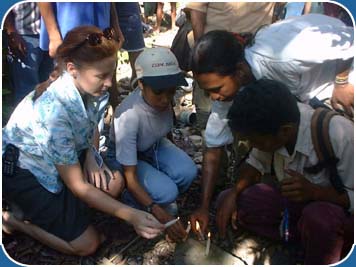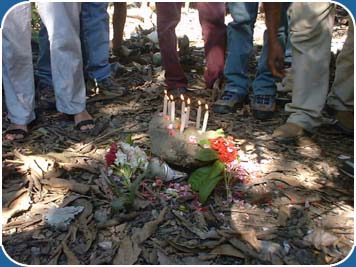|
On
September 25, 1999, a memorial service for Sander was held
in Darwin, Australia. Here you can read the speech
of Gwen Robinson, his Financial Times colleague.

Gwen's
thoughts on Sander:
I
was originally intending to say just a few words about the
joys of collaborating with one of the best journalists and
colleagues I've known. As the FT's Australia-based correspondent,
I had the privilege of working closely with Sander for nearly
2 years.
But
first, I've been asked to say a little about his final day
in East Timor. As most of you know, he had taken the initiative
in trying to arrange a charter flight to Dili the previous
week. He worked ceaselessly on it, until he managed to get
there on Tuesday. I last spoke to him 20 minutes before he
left for Jakarta airport and we discussed plans to meet. He
sounded excited and enthusiastic, as he usually did. We made
an arrangement to meet up on Tuesday evening in Dili.
On
Tuesday afternoon, I was out when he arrived at the Hotel
Turismo compound, where many journalists were staying. He
left his bags in my room and wandered outside. I must stress
at this stage that the atmosphere in Dili that day was very
positive. Thousands of refugees in the streets had been cheering
the arrival of UN troops since the previous day. For the first
time in weeks, there had been no shooting and no reports of
violence for a full 24 hours. There was no sense of threat.
Journalists
were renting motorbikes from locals, or hopping on the back
of motorbikes to go out and about the city. It was natural
that Sander -- being the kind of journalist who would want
immediately to take the pulse of the community, to know what
the situation was really like - would do the same.
A
motorbike rider had just dropped off another journalist at
the compound and Sander struck a deal with the rider. They
headed for Becora, a strongly pro-independence area of Dili
that was targeted by militia in the violence.
The
rest has been reported with varying degrees of accuracy and
unfortunately, a big degree of sensationalism. What we know
now - and I hope you, Peter, as his family representative,
and Ian, his partner, don't mind if I put this on the record
- is that he died quickly.
The
circumstances, however,and the identity of his killers is
another question. I would urge everyone to push for a quick
conclusion to the official investigation announced by Interfet.
Now
if I can turn to Sander as a journalist and highly valued
colleague. Few I have known can write about bond markets,
military politics, debt rescheduling and street poverty in
a single day - let alone write about such a diverse range
of subjects well. Even fewer can do it in at least two languages
in prominent publications across several regions of the world.

Sander
was one of the few. I only realised the extent of his talents
when I relieved him last year in Jakarta. He handed me his
impressive list of contacts, his mobile phone, keys to his
house and his computer, and went off. He was a very hard act
to follow. I couldn't believe how plugged in he was across
all sectors in Indonesia, how many friends, contacts and deep
knowledge he had.
What
particularly struck me was his lifestyle, his middle class
Indonesian house in a middle class neighbourhood. Few foreign
correspondents bother to go as "native" as Sander did, even
fewer bother to learn a language with the level of fluency
Sander attained. It was this sort of philosophy, the drive
to get right inside, which helped give him such insights into
Indonesian society.
For
me, he was a constant source of ideas and insights on the
stories we were both covering. Our relationship was conducted
largely over telephones and computers. By mid this year, we
were talking nearly every day, invariably about Timor or Indonesian
politics. He was always inspiring, encouraging and enthusiastic
- and utterly professional.
His
outstanding coverage in Indonesia and other parts of the world
was noticed by all kinds of people in many different walks
of life. I can't think of any other 30-year-old journalist
who would receive the kind of tributes now pouring in, from
the UN secretary general and the White House to governments
and organisations around the world. Not to mention the many
friends who loved and admired him.
In
many, many ways, Sander Thoenes will be an impossible act
to follow.
|